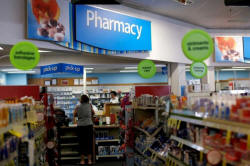|
 Trump
administration proposes altering rule on drug rebates Trump
administration proposes altering rule on drug rebates
 Send a link to a friend
Send a link to a friend
[July 20, 2018]
(Reuters) - The Trump administration has
proposed a rule that would scale back protections currently in place
that allow rebates between drug manufacturers and insurers and pharmacy
benefits managers, according to the Office of Management and Budget
(OMB) website.
|
|
 Bloomberg first reported the existence of the proposed rule, which
comes as the administration works to implement a wide-ranging plan
to lower prescription medicine prices. The U.S. Department of Health
and Human Services on Wednesday night sent the proposed rule to the
OMB. Bloomberg first reported the existence of the proposed rule, which
comes as the administration works to implement a wide-ranging plan
to lower prescription medicine prices. The U.S. Department of Health
and Human Services on Wednesday night sent the proposed rule to the
OMB.
Details of the proposed rule have not yet been made public, but its
title on the OMB site refers to removing the safe harbor protection
for rebates from the anti-kickback law.
The move is the first concrete sign that the Trump administration
has started to review the legal status of these rebates since Food
and Drug Administration Commissioner Scott Gottlieb raised the idea
early this year that they should not be exempted from anti-kickback
law.
The anti-kickback law makes it illegal to pay an incentive for drugs
or services that Medicare, Medicaid or other federal healthcare
programs cover.
Shares of drug wholesalers such as AmerisourceBergen Corp <ABC.N>
and McKesson Corp <MCK.N>, and pharmacy benefit managers, including
CVS Health Corp <CVS.N> and Express Scripts <ESRX.O>, fell slightly
on Thursday on the move.
The administration has placed blame on "middlemen" such as pharmacy
benefits managers - which administer drug benefits for employers and
health plans - and health insurers for driving up drug prices by
demanding hefty rebates in exchange for the broadest access to
patients. Health and Human Services Secretary Alex Azar and Gottlieb
have questioned whether rebates provided by drug manufacturers
should remain protected by federal law.
[to top of second column] |

Health and Human Services and OMB did not immediately respond to
requests for comment.
U.S. President Donald Trump made lowering prescription drug prices a
top priority during his 2016 presidential campaign. In May, his
administration unveiled a drug pricing blueprint that included broad
proposals for lowering prices that largely spared pharmaceutical
manufacturers and instead went after pharmacy benefits managers.
Pharmaceutical stocks rose after the blueprint's release.
JP Morgan analyst Lisa Gill said Wall Street overreacted to the
proposal submitted on Wednesday because rebates are only one
component of pharmacy benefits managers' profit streams.
"If there are any changes around rebates they can adjust other
aspects of the pricing model to ensure they are being paid fairly
for the value they are adding," Gill wrote.
(Reporting By Yasmeen Abutaleb; editing by Diane Craft)
[© 2018 Thomson Reuters. All rights
reserved.] Copyright 2018 Reuters. All rights reserved. This material may not be published,
broadcast, rewritten or redistributed.
Thompson Reuters is solely responsible for this content. |